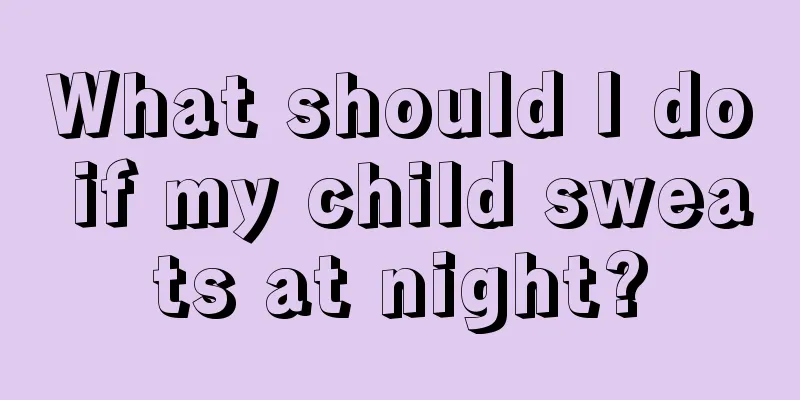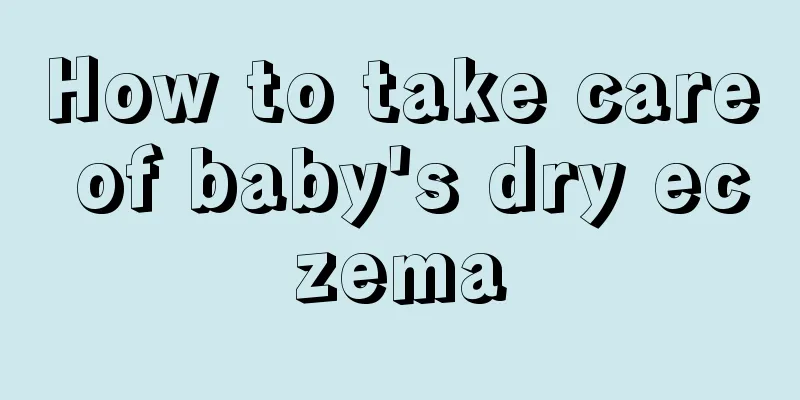What should I do if my child sweats at night?

|
When the child is sleeping soundly and sweetly. You suddenly notice sweat on your child's forehead. As a parent, wouldn’t you be very anxious? Indeed, how can they not be anxious? Any small thing that happens to their children will become a big deal in the eyes of their parents. Therefore, parents will look for the reasons in time. Parents don’t need to worry too much about their children’s sweating on their foreheads at night. Don't panic. This is of no use to children. So, what should you do if your child sweats on his head at night? Here are the answers for you! Babies sweat more than adults. Sweat is secreted by the sweat glands in the skin. Sweat glands are one of the important structures of the human skin for regulating body temperature. Children have active metabolism and a lot of activity, especially infants and young children, whose skin contains more water and has more microvessels on the surface of the skin, so more water evaporates from the skin. Besides, children have poor self-regulation ability for cold and heat, and they like to sweat even at night, which is normal. My baby sweats a lot. Is it normal or abnormal? Excessive secretion of a baby's sweat glands is called hyperhidrosis. There are two main reasons for excessive sweating in babies: Physiological hyperhidrosis and pathological hyperhidrosis. Normal reasons for babies' excessive sweating are mostly normal, which is medically called physiological hyperhidrosis. For example, the hot weather in summer causes children to sweat excessively; infants and young children sweat on their heads and necks when they just fall asleep, but the sweat decreases after they fall asleep; babies sweat a lot after playing, running and jumping, but are generally in good condition; in winter, babies wear too many clothes, the quilts are too thick at night, and the indoor air-conditioning temperature is too high, causing babies to overheat and sweat a lot. Some babies sweat only on the head and forehead, commonly known as "steamer head". This is also physiological sweating and parents do not need to worry. Identify abnormal causes of pathological hyperhidrosis in children. Excessive sweating caused by certain diseases in babies may manifest as a lot of sweating when they are quiet or after falling asleep at night. Excessive sweating can wet the pillow and clothes, which is called "pathological sweating." Such as active rickets in infants and young children, active tuberculosis in children, hypoglycemia in children, excessive dose of antipyretics and mental factors, such as excessive excitement and fear. Some babies have endocrine diseases (such as hyperthyroidism, etc.), which can also cause pathological sweating. In addition to excessive sweating, each disease also has many other disease manifestations. Parents need to take their baby to the hospital for further examinations. (1) Active rickets. Babies under one year old sweat a lot. If they lack outdoor activities and sun exposure, and do not add cod liver oil and calcium powder in time, parents should observe whether the baby has other manifestations of rickets in addition to sweating, such as crying at night, crying and shaking the head on the pillow while sleeping, resulting in hair loss circles on the back of the head (also known as occipital baldness), ping-pong head (the bone in the occipital bone becomes soft, and it feels like touching a ping-pong ball), square skull (the forehead is protruding and the head is shaped like a square box), and a large anterior fontanelle that closes late. Parents should take their baby to the hospital for examination by a doctor to make a clear diagnosis. 2) Active tuberculosis in children. Babies often sweat a lot not only in the first half of the night, but also in the second half of the night before dawn, which is called "night sweats". At the same time, there are poor appetite, low fever in the afternoon (some have high fever), flushed face, weight loss, and some have cough, enlarged liver and spleen, swollen lymph nodes and other symptoms. There is often a history of contact with tuberculosis, and the elderly, parents or nannies in the family suffer from tuberculosis. (3) Hypoglycemia. It is often seen in the hot summer when babies sweat a lot, refuse to eat at night, and feel listless when waking up in the morning. The children show symptoms of sadness and restlessness, pale complexion, cold sweats, even profuse sweating, and cold limbs. (4) Pediatric endocrine diseases (this type of disease is less common in causing excessive sweating). For example, children with hyperthyroidism are mostly school-age children, mostly girls. It may manifest as excessive sweating, irritability, increased appetite without weight gain, panic, heart palpitations, and even bulging eyes. Babies with obesity also sweat easily, and they sweat a lot when they move or walk. The above are the answers to the questions about children’s sweating heads at night. Are you satisfied? Here, the editor would like to sincerely remind you that parents do not need to worry too much when their babies sweat. At this time, you can open the windows in time. Turn on the air conditioner, but be careful not to direct the air towards your children. . These will be of great help to children! I also hope that your children can grow up healthily! |
<<: What is the reason why children sweat a lot in summer?
>>: Why does a child sweat on his head when sleeping at night?
Recommend
What should I do if my child has a cowardly character?
Personality is mostly determined by innate factor...
Will a burn on a one-year-old child leave scars?
Most children are playful and curious about most ...
2-year-old children's recipes
We know that diet plays a very important role in ...
What does convulsion mean?
Convulsion is a neurological disease that mostly ...
What to do if children have tooth decay and toothache?
What should we do if children have tooth decay an...
What's wrong with a child who can't speak for a week and a half?
Every child is an angel in the hearts of his or h...
What should I do if my child has swollen tonsils?
Enlarged tonsils is a common clinical disease, ge...
What to do if your two-year-old baby doesn't like to eat
We all know that if a baby shows symptoms such as...
Is it good for children to drink milk every night?
Many children are now over one year old, but they...
Why does my baby always grind his teeth when sleeping at night?
Generally speaking, people of any age may grind t...
Six-year-old child has headache, vomiting and low-grade fever
The immunity of a six-year-old child is not very ...
How to deal with swollen baby hands
The baby's hands are usually soft and boneles...
How to deal with a child who falls
Children's skin is very delicate, and their k...
What causes frequent fever in children?
In the process of taking care of children, what m...
At what age do children usually change their teeth?
Many people don't know at what age children u...









